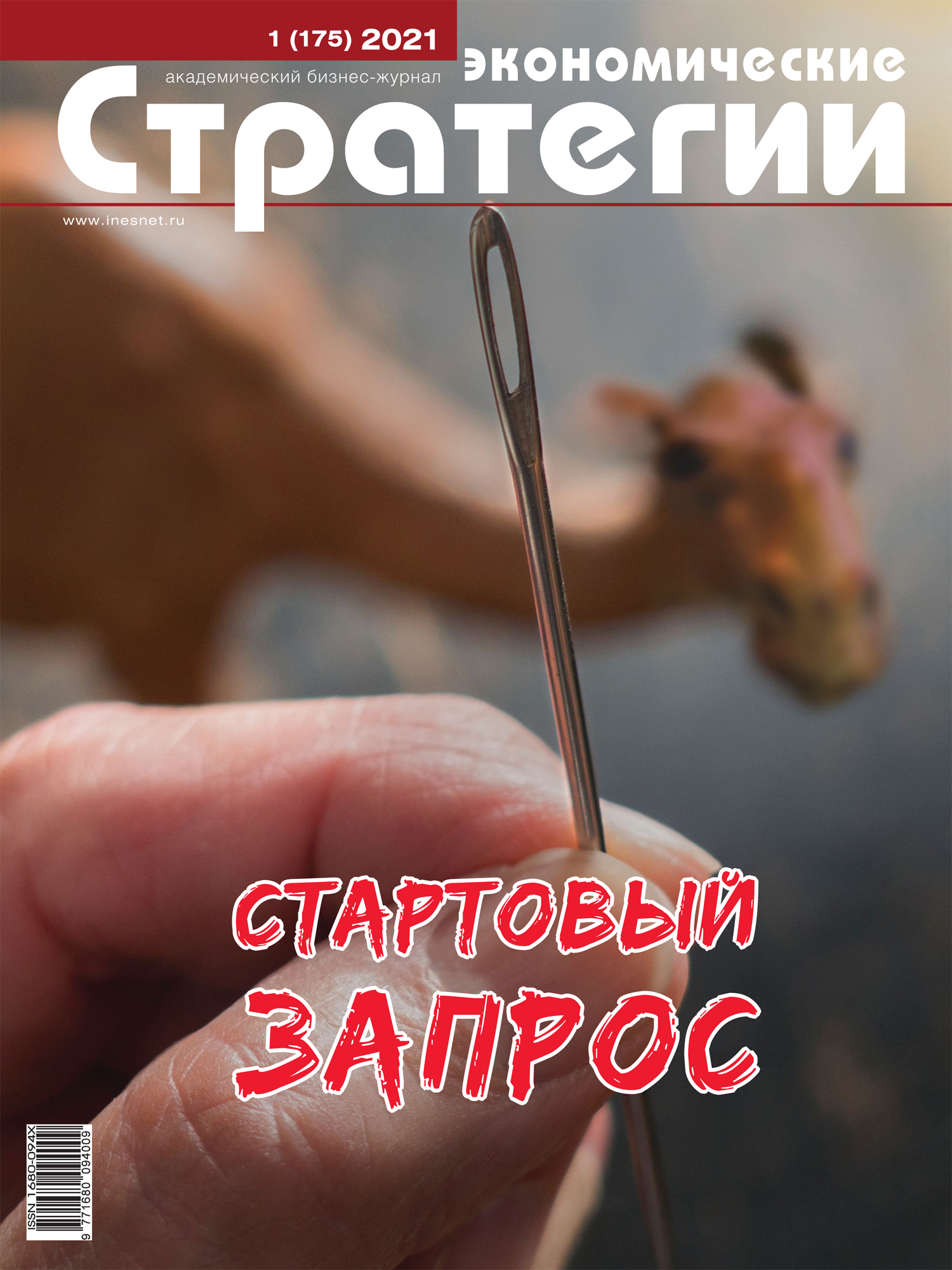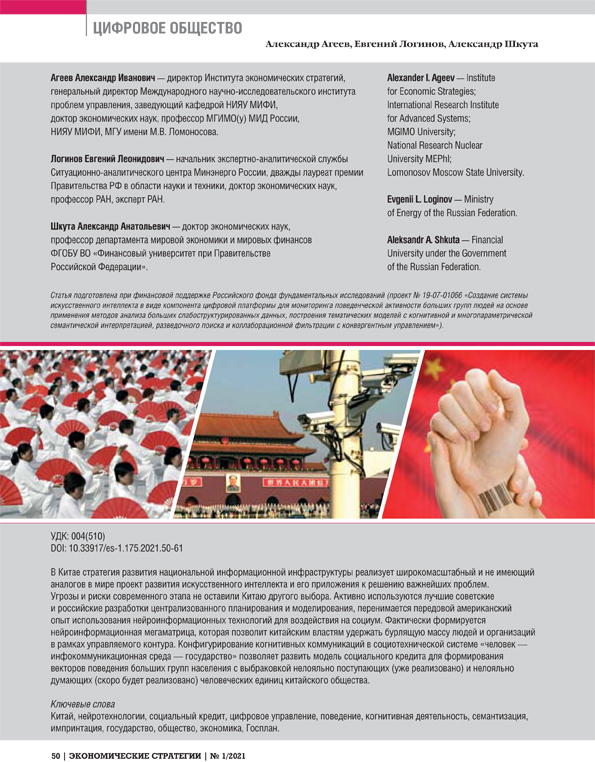China as a Neural-Information Megamatrix: Digital Technologies for Structuring Cognitive Ensembles of Order
DOI: 10.33917/es-1.175.2021.50-61
In China, the strategy for the national information infrastructure development is implementing a large-scale and unparalleled project for developing artificial intelligence and its application to solving critical problems. Threats and risks of the current stage left no choice to China. The best Soviet and Russian developments of centralized planning and modeling are actively used, advanced American experience in applying neuroinformation technologies to influence society is being adopted. In fact, a neuroinformational mega-matrix is being formed, which will allow the Chinese authorities to keep the seething mass of people and organizations within a controlled circuit. Configuring cognitive communications in the socio-technical system “person — infocommunication environment — the state” allows to develop a social credit model for forming behavior vectors in large groups of the population with culling disloyal in behaviour (implemented now) and disloyal in thinking (soon to be implemented) human units of the China-community
References:
1. Putin: lider v sfere iskusstvennogo intellekta stanet vlastelinom mira [Putin: a Leader in the Field of Artificial Intelligence will Become the Master of the World]. RIA Novosti, 2017, September, 1, available at: https://ria.ru/20170901/1501566046.html.
2. Ageev A.I., Loginov E.L. Kitai v tochke bifurkatsii: poisk novoi strategicheskoi modeli [China’s Bifurcation Point: Search for a New Strategic Model]. Ekonomicheskie strategii, 2016, no 2, pp. 20–33.
3. Neklessa A.I. Krizis istorii. Mir kak nezavershennyi proekt [Crisis of History. The World as a Pending Project]. Polis. Politicheskie issledovaniya, 2018, no 1, pp. 80–95.
4. Lyu Pen. Vozdeistvie sredstv massovoi informatsii na formirovanie tsennostnykh orientatsii molodezhi Kitaya [Impact of the Media on Forming Value Orientations of the Chinese Youth]. Aktual’nye voprosy sovremennoi nauki, 2010, no 15, pp. 169–176.
5. Ivan’ko A.F., Ivan’ko M.A., Zelenkova T.V. Osobennosti razvitiya komp’yuternykh setei v Kitae [Features of the Computer Networks Development in China]. Nauchnoe obozrenie. Ekonomicheskie nauki, 2019, no 1, pp. 27–31.
6. Edrenkina A.M. Kak amerikano-kitaiskaya konkurentsiya za vlast’ formiruet budushchee etiki iskusstvennogo intellekta [How American-Chinese Competition for Power is Shaping the Future of Artificial Intelligence Ethics]. Vestnik sovremennykh issledovanii, 2018, no 12.2, pp. 229–232.
7. Samuseva O.A. Sotsial’nyi reiting kak sistemnaya kharakteristika politicheskoi nadezhnosti v kitaiskom obshchestve [Social Rating as a Systemic Characteristic of the Political Reliability in Chinese Society]. Sotsial’no-gumanitarnye znaniya, 2019, no 6, pp. 349–361.
8. Mel’nichuk S. Bol’shoi kitaiskii brat: kak ustroena samaya moshchnaya v mire sistema total’nogo kontrolya za naseleniem [Big Chinese Brother: How the World’s Most Powerful System of Total Control Over the Population Works]. Lenta.ru, 2019, August, 22, available at: https://lenta.ru/articles/2019/08/22/credit/
9. Yushkov I.V. Sistema sotsial’nogo kredita v Kitae kak innovatsionnaya metodika upravleniya obshchestvom [Social Credit System in China as an Innovative Method of Social Management]. Nauchno-analiticheskii zhurnal “Obozrevatel’” — Observer, 2019, no 12, pp. 60–69.
10. Komissina I.N. Sovremennoe sostoyanie i perspektivy razvitiya tekhnologii iskusstvennogo intellekta v Kitae [Current State and Prospects for Development of the Artificial Intelligence Technologies in China]. Problemy natsional’noi strategii, 2019, no 1, pp. 137–160.
11. Next Generation Artificial Intelligence Development Plan. The State Council of People’s Republic of China. Gov.cn, 2017, July, 20, available at: http://www.gov.cn/zhengce/content/2017–07/20/content_5211996.htm.
12. China’s security chief calls for greater use of AI to predict terrorism, social unrest. South China Morning Post. Scmp.com, available at: http://www.scmp.com/news/china/policies-politics/article/2112203/china-security-chief-calls-greater-use-ai-predict.
13. Strel’tsov E.Yu. Novyi totalitarizm ili izderzhki tsifrovoi revolyutsii: Tsifrovaya ekonomika i rynok truda budushchego: Materialy vserossiiskoi nauchnoi konferentsii [New Totalitarianism or the Digital Revolution Costs: Digital Economy and the Labor Market of the Future: Proceedings of the All-Russian Scientific Conference]. Saint Petersburg, Leningradskii gosudarstvennyi universitet, 2019, pp. 93–97.
14. Kozyrev A.N., Nevolin I.V. Sotsial’nyi kredit v Kitae: Obzor [Social Credit in China: An Overview]. Tsifrovaya ekonomika, 2019, no 3, pp. 70–74.
15. Camera Above the Classroom Chinese schools are using facial recognition on students. But should they? Sixth Tone, 2017, September, 18, available at: http://www.sixthtone.com/news/1003759/camera-above-the-classroom%C5%BE#
16. Primshits D., Golubev S. Kitaiskii podkhod k uskorennomu osvoeniyu tekhnologii iskusstvennogo intellekta [Chinese Approach to Accelerated Development of Artificial Intelligence Technologies]. Nauka i innovatsii, 2019, no 4, pp. 43–50.
17. Mikheev Yu.A., Lisitsin V.G. Eskiznyi proekt. Svodnyi tom. Obshchegosudarstvennaya avtomatizirovannaya sistema sbora i obrabotki informatsii dlya ucheta, planirovaniya i upravleniya narodnym khozyaistvom (OGAS) [Draft Project. Consolidated Volume. The Nationwide Automated System for Collection and Processing of Information for Accounting, Planning and Management of the National Economy (OGAS)]. Gosudarstvennyi komitet SSSR po nauke i tekhnike. Vsesoyuznyi nauchno-issledovatel’skii institut problem organizatsii i upravleniya. Gos. reg. N 75052902.
18. Loginov E.L., Bortalevich V.Yu., Grigor’ev V.V., Abramov V.I. Tsifrovaya rekonkista v mirovoi ekonomike i v Rossii: kriticheskaya potrebnost’ v strategicheskoi predopredelennosti v usloviyakh global’noi neopredelennosti [Digital Reconquista in the World Economy and in Russia: Critical Need for Strategic Predetermination in the Face of Global Uncertainty]. Iskusstvennye obshchestva, 2019, no 1, p. 6.
19. Makarov V.L., Vu Ts., Vu Z., Khabriev B.R., Bakhtizin A.R. Sovremennye instrumenty otsenki posledstvii mirovykh torgovykh voin [Modern Tools for Assessing the Consequences of World Trade Wars]. Vestnik Rossiiskoi akademii nauk, 2019, no 7, pp. 745–754.
20. Makarov V.L., Bakhtizin A.R., Sushko E.D., Ageeva A.F. Agent-orientirovannaya model’ Evrazii i imitatsiya realizatsii krupnykh infrastrukturnykh proektov [Agentbased Model of Eurasia and Imitation of the Implementation of Large Infrastructure Projects]. Ekonomika regiona, 2018, no 4, pp. 1102–1116.
21. Makarov V.L., Bakhtizin A.R., Sushko E.D., Sushko G.B. Agent-orientirovannaya superkomp’yuternaya demograficheskaya model’ Rossii: analiz aprobatsii [Agent-based Supercomputer Demographic Model of Russia: Analysis of Approbation]. Ekonomicheskie i sotsial’nye peremeny: fakty, tendentsii, prognoz, 2019, no 6, pp. 74–90.
22. Ageev A.I., Loginov E.L. Rossiya v novoi ekonomicheskoi real’nosti [Russia in a New Economic Reality]. Monografiya. Moscow, Institut ekonomicheskikh strategii, Assotsiatsiya “Analitika”, 2016, 460 p. (Seriya “Biblioteka ‘Strategicheskaya analitika’”.)
23. Ageev A.I., Loginov E.L Gosplan — osnovnye podkhody k planirovaniyu sotsial’no-ekonomicheskogo razvitiya Rossii [Gosplan — the Main Approaches to Planning the Socio-Economic Development of Russia]. Ekonomicheskie strategii, 2013, no 8, pp. 100–112.
24. Loginov E.L., Lukin V.K., Derkach K.Yu., Loginova V.E. Informatsionno-analiticheskie podkhody k optimizatsii tovarnykh i finansovykh operatsii na otraslevykh rynkakh na osnove integratsii elektronnykh torgovykh system [Information and Analytical Approaches to Optimizing Commodity and Financial Transactions in Industry Markets Based on the Integration of Electronic Trading Systems]. Finansovaya analitika: problemy i resheniya, 2014, no 21, pp. 8–13.
25. Vaino A.E., Kobyakov A.A., Saraev V.N. Kod rynka [Code of the Market]. Ekonomicheskie strategii, 2011, no 12, pp. 88–96.
26. Vaino A.E., Kobyakov A.A., Saraev V.N. Obraz pobedy [Image of Victory]. Moscow, INES, 2012, 140 p.
27. Raikov A.N. Kognitivnoe programmirovanie [Cognitive Programming]. Ekonomicheskie strategii, 2014, no 4, pp. 108–113.
28. Izotova E.I. Sotsial’nye i kognitivnye determinant kodirovaniya emotsii v real’nom i virtual’nom prostranstve [Social and Cognitive Determinants of Emotion Coding in Real and Virtual Space]. Psikhologicheskie issledovaniya: elektronnyi nauchnyi zhurnal, 2015, no 42, p. 7.
29. Loginov E.L., Raikov A.N., Shkuta A.A. Ispol’zovanie neirotekhnologii pri programmirovanii kognitivno-povedencheskikh stereotipov deistvii lichnostei dlya ustoichivogo funktsionirovaniya sistem upravleniya sotsiumom [Applying Neurotechnologies in Programming Cognitive-Behavioral Stereotypes of Individual’s Actions for Sustainable Functioning of Social Management Systems]. Neirokomp’yutery: razrabotka, primenenie. 2018, no 9, pp. 34–45.
30. Ageev A.I., Loginov E.L., Shkuta A.A., Derkach A.K. Setevoe neirokognitivnoe upravlenie slozhnoorganizovannymi strukturami s politicheskoi komponentoi v nechetkikh informatsionnykh sredakh [Network Neurocognitive Management of Complex Structures with a Political Component in Vague Information Environments]. Mikroekonomika, 2019, no 5, pp. 5–13.
31. Ageev A.I., Loginov E.L., Shkuta A.A. Neirooperirovanie povedeniem kognitivnykh agentov na osnove elektronnoi semanticheskoi interpretatsii sostoyanii soznaniya i psikhiki s effektami pogruzheniya, prisutstviya i edineniya s virtual’noi real’nost’yu [Network Neurocognitive Management of Complex Structures with a Political Component in Vague Information Environments]. Mikroekonomika, 2020, no 1, pp. 5–12.
32. Kovsh E.M., Ermakov P.N., Vorob’eva E.V. Otrazhenie urovnya agressivnosti i vrazhdebnosti v vyzvannoi aktivnosti mozga muzhchin pri otsenke emotsional’no okrashennykh stimulov [Reflecting the Level of Aggression and Hostility in the Evoked Brain Activity of Men When Assessing Emotionally Charged Stimuli]. Vestnik Leningradskogo gosudarstvennogo universiteta im. A.S. Pushkina, 2016, no 4–1, pp. 55–66.
33. Loginov E.L., Shkuta A.A. Iskusstvennyi intellekt v organakh gosupravleniya [Artificial Intelligence in Government Bodies]. Gosudarstvennaya sluzhba, 2017, no 5, pp. 24–29



